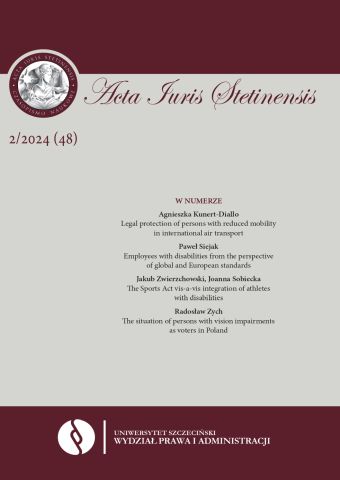Civil-law aspects of carrying out an economic activity by persons with disabilities who do not have full capacity to perform acts in law
Civil-law aspects of carrying out an economic activity by persons with disabilities who do not have full capacity to perform acts in law
Author(s): Katarzyna Malinowska-WoźniakSubject(s): Politics / Political Sciences, Law, Constitution, Jurisprudence, Civil Law, Political Sciences, Law on Economics, Labour and Social Security Law
Published by: Wydawnictwo Naukowe Uniwersytetu Szczecińskiego
Keywords: entrepreneur; economic activity; capacity to perform acts in law; disability
Summary/Abstract: The aim of this paper is to present civil-law aspects of carrying out an economic activity by persons with disabilities who do not have full capacity to perform acts in law. Key to this discussion was a hypothesis that persons with disabilities who do not have full capacity to perform acts in law may de lege lata carry out an economic activity. In the course of the analysis, relevant provisions of the Civil Code, Family and Guardianship Code, the Code of Civil Procedure, the Act on the Central Register and Information on Economic Activity and the Entrepreneurs Act are analysed using the method of investigation of the law in force. The analysis also covers proposals for legislative changes included in the draft act on amending certain acts to improve the legal and institutional environment for entrepreneurs. The research yields the following conclusions. Natural persons who do not have full capacity to perform acts in law may carry out an economic activity in their own name, though they perform acts associated with their activity with the participation of a statutory representative. Persons with limited capacity to perform acts in law may perform certain actions related to their business activity on their own. The taking up of an economic activity and other important matters related to economic activity require consent of the family and guardianship court. Introduction of legislative changes that involve clarification of principles of taking up and running an economic activity by persons who do not have full capacity to perform acts in law seems valid. Legislative proposals presented in the draft law of 13 April 2023 are insufficient and flawed, though the direction of changes must be recognized as correct.
Journal: Acta Iuris Stetinensis
- Issue Year: 2024
- Issue No: 48 (2)
- Page Range: 35-48
- Page Count: 14
- Language: English

